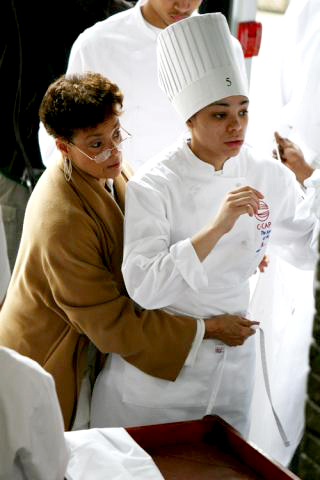|
Reviews of Recent Independent, Foreign, & Documentary Films in Theaters and DVD/Home Video
PRESSURE COOKER This engaging documentary quietly won the hearts of audiences country wide, and multiple awards to boot, as it charged through the mid-tier festival circuit over the past year. With stops at many of the socially conscious and nonfiction hotspots, including the Los Angeles Film Festival (where it won a special jury prize), Pressure Cooker’s propulsive itinerary is a case study in indy-nertia. Despite modest budgets and the limitations of a niche subject, films like this are hard to keep hidden, and not surprisingly, this gem has persevered through a rigorous screening schedule and onward to a theatrical release. Three African-American high school seniors at a working-class high school in North Philly are the subjects of this socially-conscious doc that explores the means to, and perhaps the meaning of, achievement. The students are enrolled at the school’s culinary arts program, taught by a self-admitted hard-ass, Mrs. Wilma Stephenson, whose strict requirements range from obedience and precision to repeated pleas to drop what she calls the “mentality of the MacDonald’s palate.” Acerbic and sassy, she’s the loudest thing at this high school, and that includes the football games. Even Coach Capriotti and his star defensive tackle, Tyree Dudley (who’s also one of Mrs. Stephenson’s pet students), jump at her command, but as directors Mark Becker and Jennifer Grausman immediately recognize, she has a strong commitment to the success of her students. It’s not only Mrs. Stephenson’s exacting standards, though, that provide the guidance for that success (annually her students receive more scholarships in culinary arts than at any other school in the country). Enrichment programs like hers are most effective when they focus on generating student interest. Dudley’s identity as an athlete, and his hopes for a football scholarship, isn’t enough to dissuade his leanings toward cooking, and it’s exactly this kind of well-roundedness that allows students to succeed. In response to some of her students’ less creative options for crêpe arrangement, Mrs. Stephenson, who is black, calls out, “That’s so ghetto.” Rather than straight A’s or a high salary, she sees good taste and a variety of interests as alternatives to the ghetto, and she’s not far off. Coach
Capriotti provides a larger perspective, as he drives through his old
neighborhood, pointing out factory after factory that has since closed
its doors. “I guess it started happening with the rest of the country,”
he says, lamenting the rise of the retail sector in the place of higher
paying, stable career jobs. As evidenced in this smart film, diverse
programs in the public education system, like Frankford High’s culinary
arts course, are part of the promising work underway in inner-city
education. Seeing it happen firsthand is nothing short of moving.
Michael Lee
|


